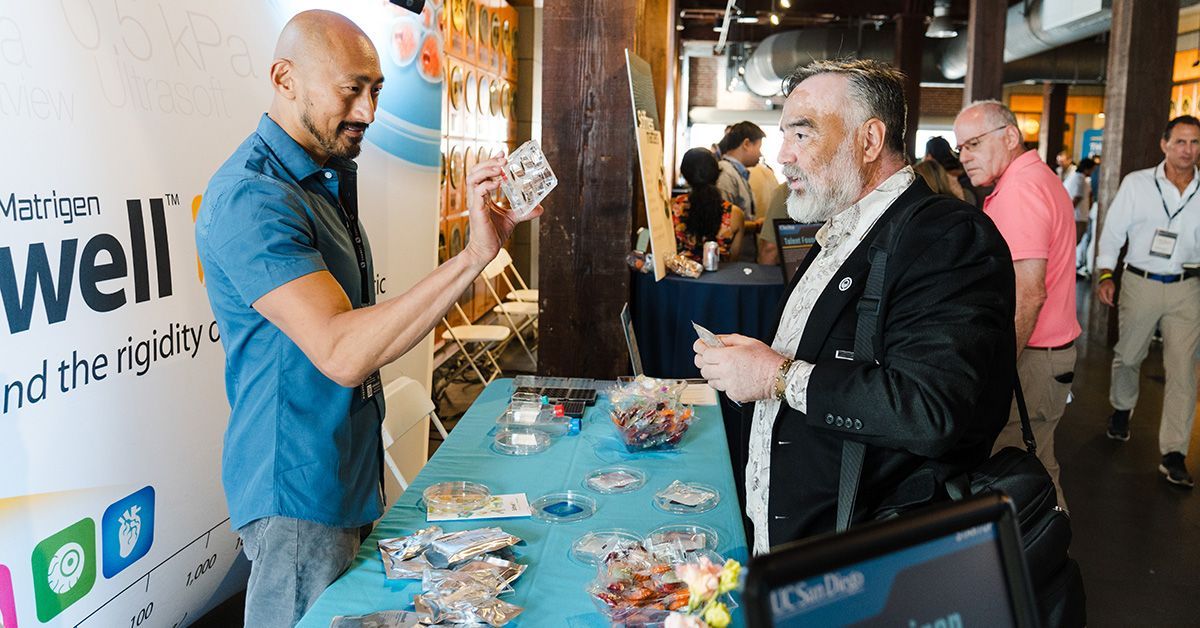Exploring the Future of Innovation in San Diego
UC San Diego’s world-class, dynamic innovation ecosystem takes center stage during annual event
Story by:
Published Date
Article Content
A test strip that provides non-invasive glucose sensing using the natural sweat from your fingertip. A self-guided tour app that leverages generative AI to deliver personalized and interactive tour and travel experiences. A gut health test that uses a novel machine learning platform to provide comprehensive personal health insights.
The companies behind these emerging technologies—Persperion Diagnostics, Drives & Detours and BrilliantBiome, respectively—could one day become household names. What do they all have in common? They’re startups powered by the University of California San Diego’s world-class, dynamic innovation ecosystem.
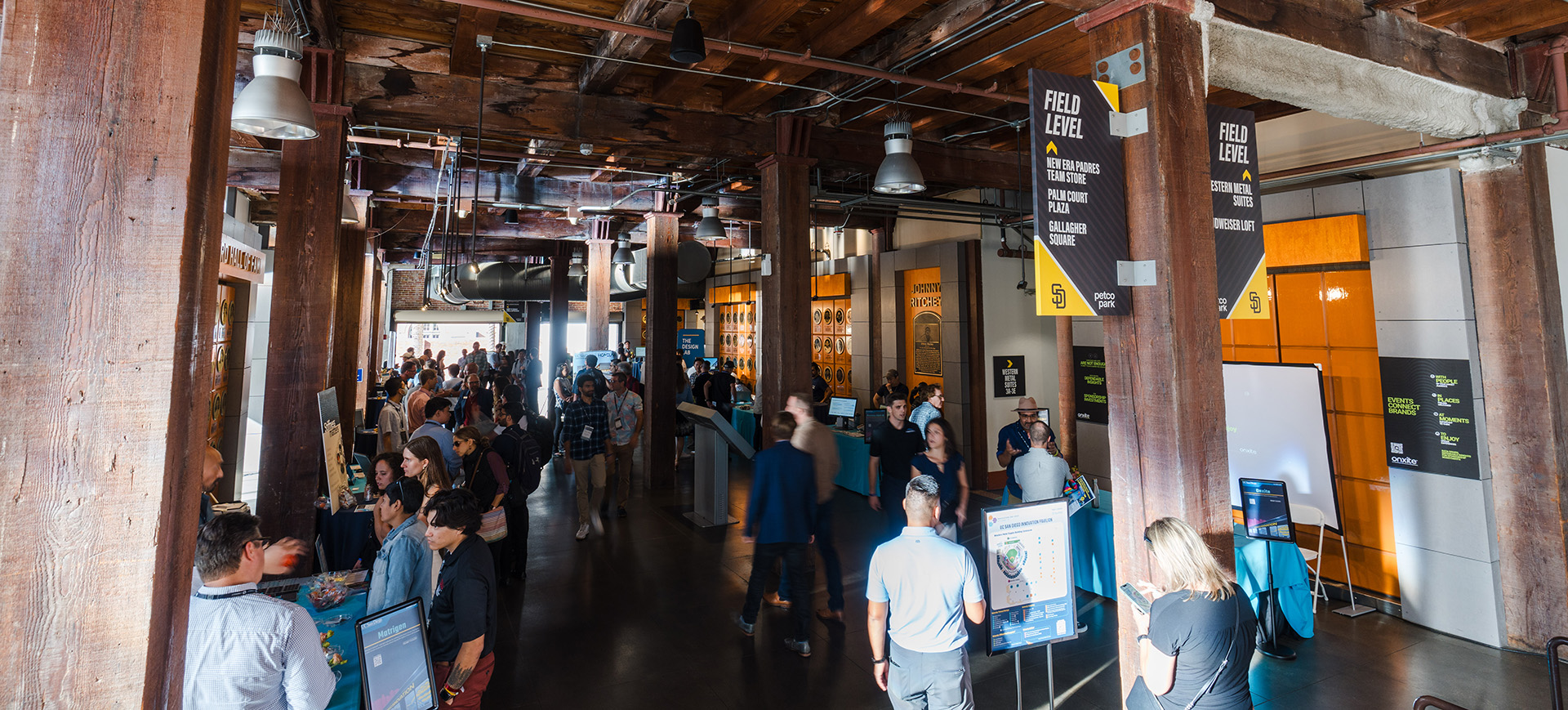
On Sept. 14, they were among the many promising UC San Diego startups, technologies and interdisciplinary collaborations that took center stage during the second annual Innovation Day at Petco Park. Their founders and CEOs joined local startup accelerator Connect, venture capitalists, angel investors, industry executives, national security leaders and others to collectively explore the future of innovation in San Diego.
UC San Diego was proud to co-sponsor this impactful event and showcase its diverse entrepreneurial campus culture. The university has seen more than 1,000 campus-affiliated startups launch in the past 30 years, making it a leader among top universities in startup creation.
“At UC San Diego, we play a leading role in integrating research and innovation into the student experience through hands-on entrepreneurship training, mentoring, funding challenges and networking,” said Vice Chancellor for Research Corinne Peek-Asa at an evening VIP networking reception. “Our success is integrated with the great San Diego innovation region, and we are committed to continuing to contribute to our local creative and transformative innovation culture. We aim to work with the community to develop technologies that will drive the industries of the future and develop the innovation workforce that will create those industries.”
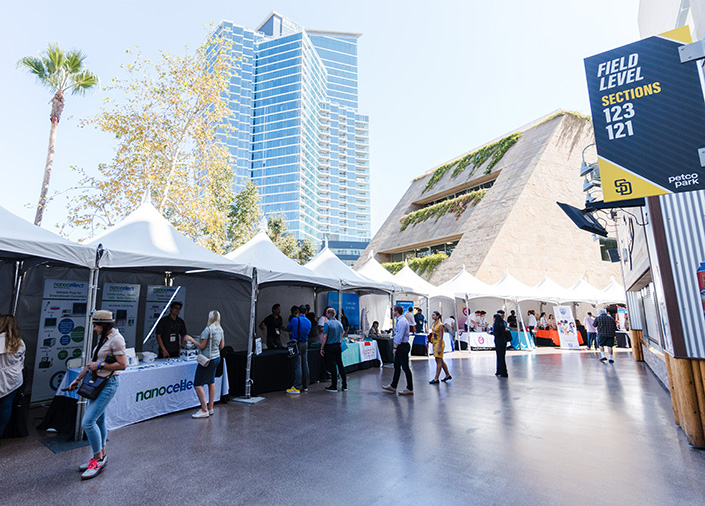

There was a palpable excitement in the air throughout the ballpark concourses as attendees mixed, mingled and networked during the full-day event, perusing exhibits by more than 200 life science and technology companies, attending talks, panels and pitches—and even enjoying a live music performance by Grammy Award-winning rock band Ozomatli to close out the evening.
The Western Metal Supply Building Concourse was transformed into the UC San Diego Innovation Pavilion, where university-powered startups, incubators, accelerator programs and other campus entities offered an up-close look into what makes UC San Diego a global hub of innovation and entrepreneurship.
“Innovation Day offers an opportunity to highlight San Diego as one of the most innovative and disruptive regions of the world, and especially to showcase UC San Diego’s role in driving that innovation—developing the innovation workforce of the future, creating new technologies, new industries and jobs and improving the quality of life in the region,” said Paul Roben, associate vice chancellor for Innovation and Commercialization at UC San Diego.
Leading the way in research and discovery
A VIP early access event, held in the Western Metal Supply Building Loft before the gates officially opened for general admission, drew a substantial crowd. Attendees had the opportunity to listen and participate in a Q&A as part of a curated lineup of “InSight” talks and panels, featuring several of UC San Diego’s globally recognized faculty among other prominent experts. These presentations focused on the future of innovation and provided a glimpse of what to expect in the years to come.
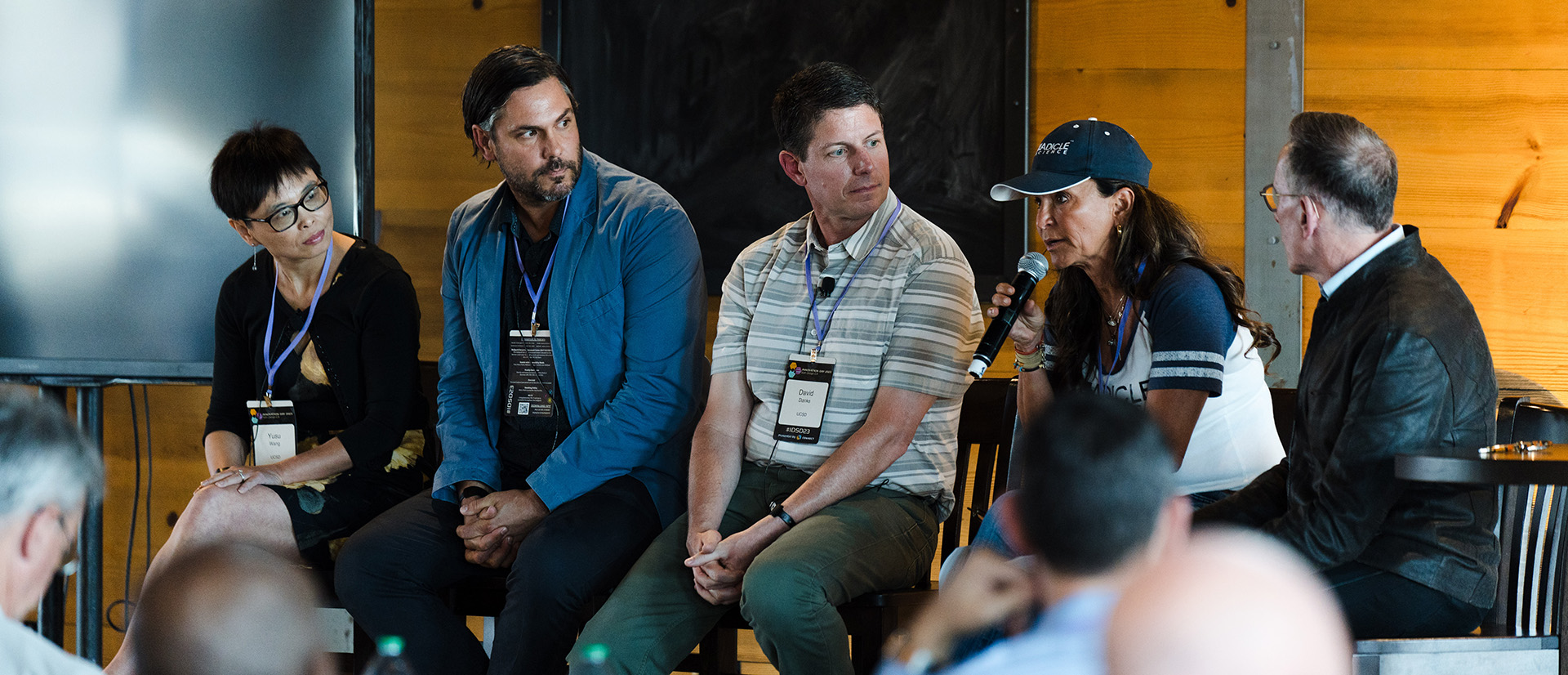
Dr. Catriona Jamieson, director of the Sanford Stem Cell Institute at UC San Diego, and Dr. Alysson Muotri, a professor in the Departments of Pediatrics and Cellular & Molecular Medicine at UC San Diego School of Medicine, delivered a talk entitled “Lab to Orbit: Unlocking the Secrets of Aging by Studying Brain and Cancer in Space,” highlighting the advancements in space research that have opened new frontiers in understanding complex biological processes. Earlier this year, the university announced the launch of a new Astrobiotechnology Hub, which brings together academic, industry and government partners to drive scientific and commercial innovation in stem cell research conducted in space.
Examining the role that the human microbiome plays in how food affects an individual’s weight, health and mood, Rob Knight, director of the Center for Microbiome Innovation and a professor of pediatrics, bioengineering and computer science & engineering at UC San Diego, covered some of the latest cutting-edge research linking diet to physical and mental health.
Additionally, experts from diverse disciplines explored the vast implications of artificial intelligence in a panel discussion moderated by Greg Horowitt, director of innovation design at UC San Diego. Panelists included David Danks, a professor of data science and philosophy at UC San Diego; Yusu Wang, a professor in the Halıcıoğlu Data Science Institute and director for the NSF National AI Institute TILOS; Pelin Thorogood, co-founder and executive chairwoman at Radicle Science and trustee and treasurer of the UC San Diego Foundation; and Robert Twomey, an assistant professor of emerging media arts at the University of Nebraska-Lincoln and artist-in-residence with the Arthur C. Clarke Center for Human Imagination at UC San Diego.
Growing and giving back
As soon as Innovation Day officially kicked off at 2 p.m., the UC San Diego Innovation Pavilion was bustling with participants looking to invest, network, learn and collaborate.
“You never know who you’ll meet at an event like this,” said Sierra Simpson, PhD ’20, founder and CEO of BrilliantBiome and associate director of the Division of Perioperative Informatics at UC San Diego School of Medicine.
Launched in 2020, BrilliantBiome is a microbiome precision medicine platform that leverages AI, machine learning and multi-omics to deliver actionable information on how to improve your gut health through a simple at-home test.
As she scales her company, Simpson credits the innovation ecosystem at UC San Diego with providing her with vital resources that have set BrilliantBiome up for success, including the StartR Accelerator at the Rady School of Management’s Sullivan Center for Entrepreneurship and Innovation; the Institute for the Global Entrepreneur MedTech Accelerator; and the Office of Innovation & Commercialization, which granted BrilliantBiome an Accelerating Innovation to Market grant in 2021. The Altman Clinical and Translational Research Institute (ACTRI) also helped BrilliantBiome launch its first clinical study.
Simpson says she’s grateful for the opportunities, guidance, and support the university has provided. After UC San Diego opened the Design and Innovation Building, its campus hub for innovation and entrepreneurship, in 2021, she has given back by serving there as a speaker and mentor for other women in science who are interested in following a similar path.
Gaining exposure and feedback
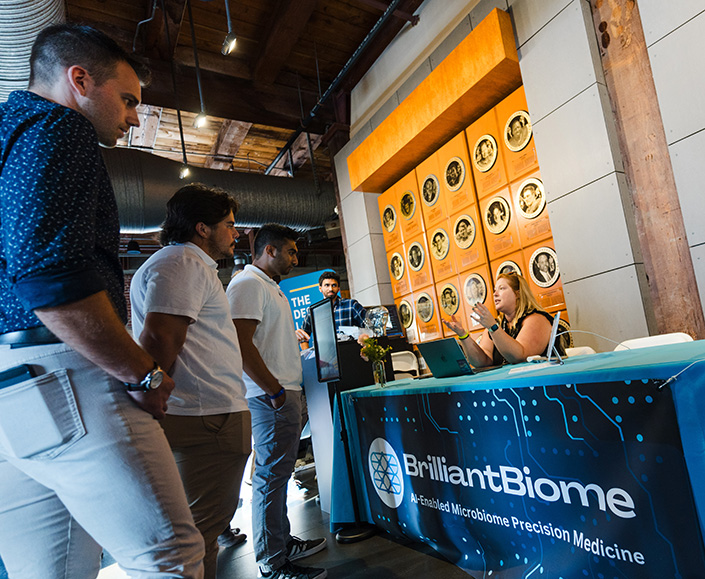
Just around the corner from Simpson’s BrilliantBiome table, Paul Behnke, MBA ’14, used Innovation Day as an opportunity to gain exposure for his company and feedback on his business model. As founder and CEO of Drives & Detours, a B2B technology platform for the travel and tourism industry that provides self-guided driving and walking tours through a mobile app that launched earlier this year, Behnke and his team are building the first self-guided tour platform to leverage generative AI.
“Up until now, we’ve been mostly focused on the B2B market, but there’s an opportunity to go direct-to-consumer, so an event like this is really helpful,” said Behnke, whose company aims to make tourism more affordable and accessible to everyone.
For Behnke, participating in the StartR Accelerators at UC San Diego—which provide students, alumni and researchers with training, mentorship and resources to advance entrepreneurial ideas from concept to impact—was instrumental.
“From law to venture financing and pretty much every aspect of starting a business, it was really helpful,” said Behnke. “The Stage 2 program really built on that and forced me to get out and talk to customers and talk to people earlier than I would have otherwise. Getting that feedback really helped me focus the direction we were headed and figure out what was going to work.”
Taking the next steps
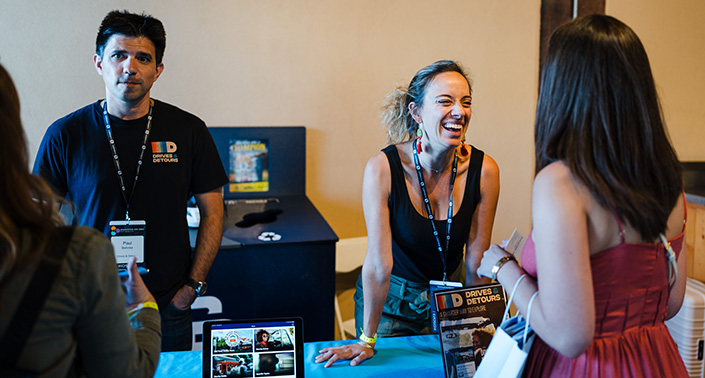
Lu Yin, PhD ’22, founder and CEO of Persperion Diagnostics, was studying in the Department of Nanoengineering at UC San Diego in 2019 when he and his classmate Alan (Xinyu) Liu, BS ’19, successfully developed a sensor in Joseph Wang’s Nanobioelectronics Lab that can measure biomarkers like metabolites, electrolytes, hormones, drugs and more using just a trace amount of a sweat from a fingertip.
Wang, a distinguished professor in the Jacobs School of Engineering, encouraged the duo to start a company based on this technology—and thus, Persperion was founded in 2022.
Starting with non-invasive glucose sensing for people with diabetes, Yin and Liu are currently working to finalize their product design and complete their pilot clinical trials before going for another round of fundraising to get through FDA approvals. Their business is currently operating out of the Entrepreneurship Center on the 4th floor of the Design & Innovation Building at UC San Diego, where they have the opportunity to collaborate daily with fellow innovators in a multidisciplinary environment.
According to Yin, the resources provided by the Institute for the Global Entrepreneur—particularly the NSF I-Corps program and MedTech Accelerator—helped him translate his mindset and vocabulary from engineer to entrepreneur. With support from the Office of Innovation & Commercialization, Persperion has licensed its technology through the university and has utilized the services of the ACTRI Device Acceleration Center for prototype testing and clinical trials. As Persperion prepares to move off campus, Yin credits UC San Diego with giving his team the tools they need to become more independent.
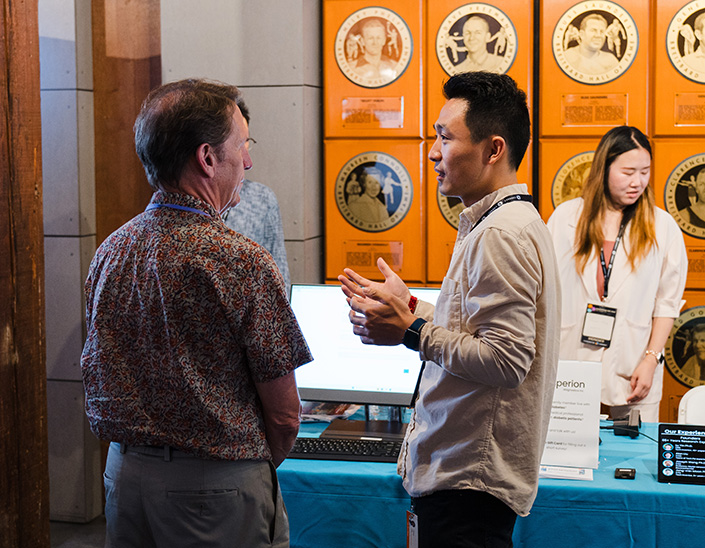
Embracing exploration and experimentation
UC San Diego embraces an inclusive culture of exploration and experimentation through a substantial number of programs, resources and campus spaces that encourage risk-taking and interdisciplinary collaboration. These efforts include entities like the Talent Foundry, which provides personalized mentorship, business coaching and support for founders from diverse backgrounds, to the state-of-the-art Design & Innovation Building—home of spaces such as The Basement, a student-focused incubator and The Design Lab, aimed at addressing complex problems facing society.
Share This:
You May Also Like
$10 Million Grant from Price Philanthropies Launches Behavioral Health Hub at UC San Diego Health
Health & BehaviorStay in the Know
Keep up with all the latest from UC San Diego. Subscribe to the newsletter today.
